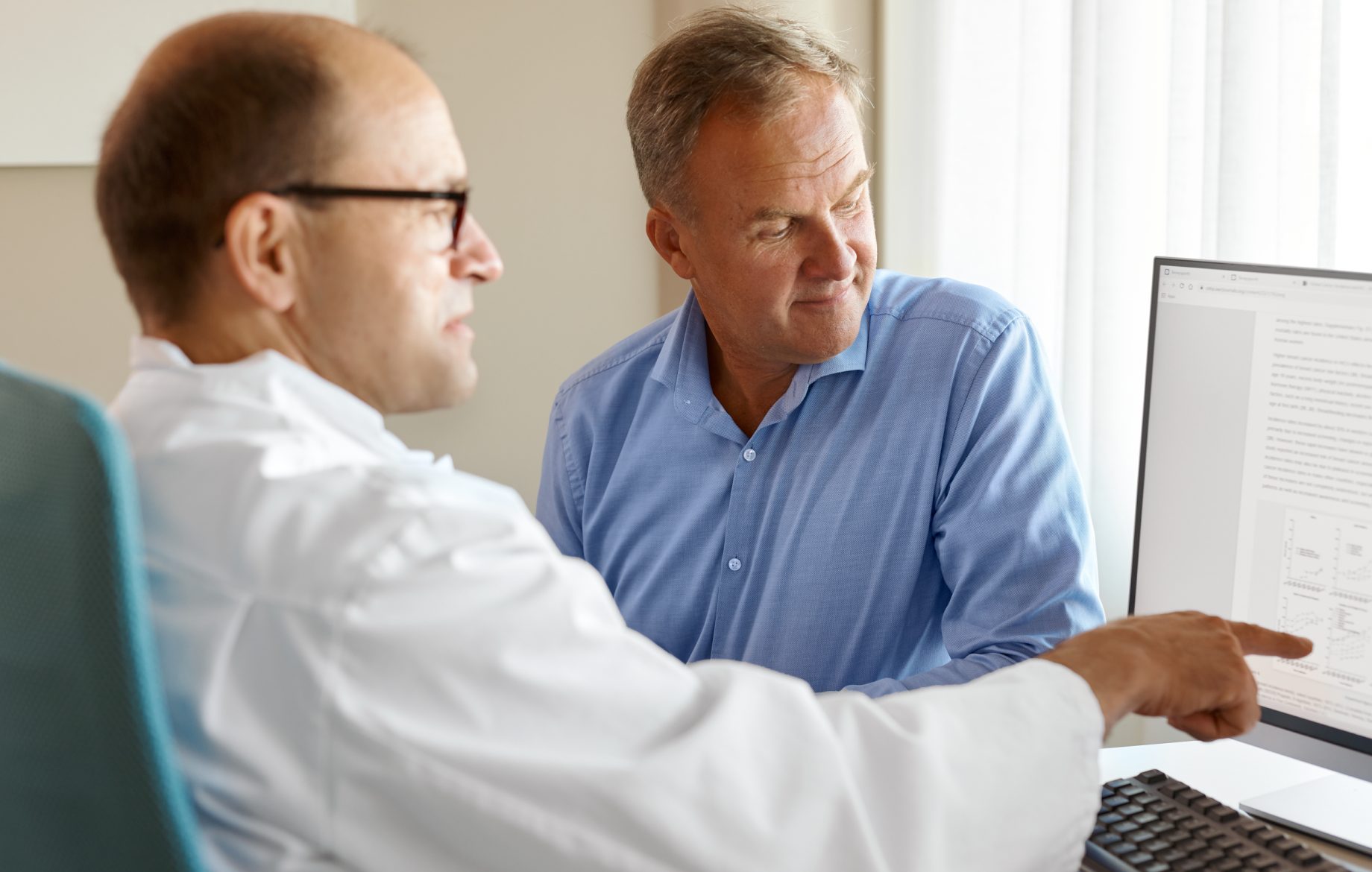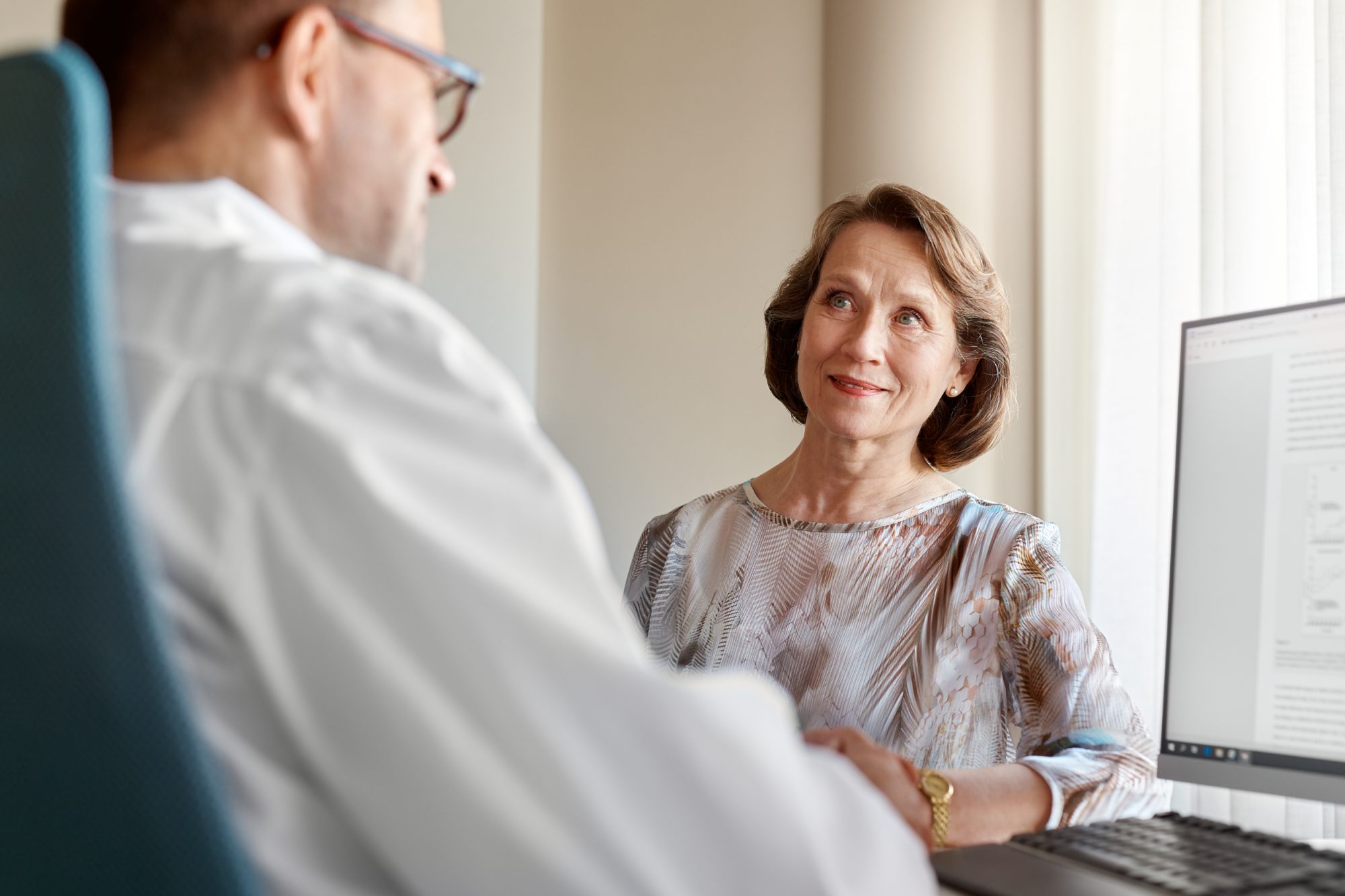Risk factors for prostate cancer
The risk factors for prostate cancer are the factors which significantly increase the likelihood of someone getting cancer. A risk factor itself does not cause prostate cancer but it may increase the risk of getting cancer.
Age
Typically, prostate cancer mainly affects elderly men. Like in many other cancers, age is the greatest risk factor of prostate cancer. This is due to the fact that the DNA of our cells carries faults or mutations, which can cause cancer.
Genetic predisposition to cancer
A small percentage of all prostate cancers is hereditary. If close male relatives have prostate cancer that has been diagnosed at a younger age, it is possible that the cancer is hereditary.
Unhealthy habits
Unhealthy habits such as smoking and a wrong kind of diet, heavy alcohol consumption as well as immobility and overweight may increase the risk of prostate cancer.
Hormone levels
A higher level of androgens or male hormones (testosterone and dihydrotestosterone) may affect the risk of getting prostate cancer. Genetic or environmental factors can increase hormone levels. Even the female hormone oestrogen is known to be linked with the onset of cancer and its progress.
Diseases and infections
Prostate gland infections as well as a history of sexually transmitted diseases may increase the risk of getting prostate cancer.
Prevention of prostate cancer
We cannot influence the predisposition to cancer brought by our age, sex or heredity. Our own behaviour and environment have an influence on the emergence of cancer, and being aware of that is significant when trying to prevent the onset of cancer in advance. According to research, approximately one third of cancers could be prevented in advance given the right lifestyle. Bearing in mind the prevention of prostate cancer, it is important to keep the normal weight, to avoid smoking, to have low alcohol consumption and a diet mostly consisting of vegetables.
Prostate cancer and nutrition
According to the research, in addition to eating vegetables, excessive consumption of agricultural products should be avoided (the daily intake of calcium should not exceed 1500 mg. Note: calcium products do not seem to increase the risk of getting ill). In terms of prostate health, it would also be advantageous to men to replace 1-2 daily portions of milk products by soy products, such as soy yoghurt or soy beverages or to use tofu or crushed soybean 1-3 times a week. In addition, according to the research the use of vegetables containing plenty of carotenoids reduces the risk of getting prostate cancer. Particularly carrots, kale, spinach, pumpkins, rose hips, sweet potato, tomato, papaya, watermelon, and bell pepper all contain carotenoids.
It is good to bear in mind moderation. During human life, the everyday diet has a crucial influence on the risk of cancer, which means that single setbacks are not detrimental.
According to international research, it is better to get the necessary vitamins and other dietary supplements from food and not from pills that are taken separately. It has been suggested that antioxidant supplements may even increase the risk of getting cancer.
Hereditary cancer risk evaluation
When several persons in the same family are diagnosed with prostate cancer or if the type of cancer that is usually detected at an older age is diagnosed early, genetic counselling might be advisable. Genetic predisposition to cancer can be determined by a specialist in genetics. If necessary the specialist can make a hereditary cancer risk evaluation.
Lifestyle is relevant, and follow-up is important
In an attempt to prevent prostate cancer, the best way is to have a healthy diet and pursue diverse physical activities, avoiding smoking and other unhealthy lifestyles.
At an older age, it is good to monitor the potential development of prostate cancer by undegoing PSA testing and health checks on a regular basis. When suspecting genetic predisposition to cancer, regular follow-up is also advisable.
If you wish to book an appointment with nutrition therapist Reijo Laatikainen or consider having a hereditary evaluation made, please call our phone service +358 10 773 2010.










